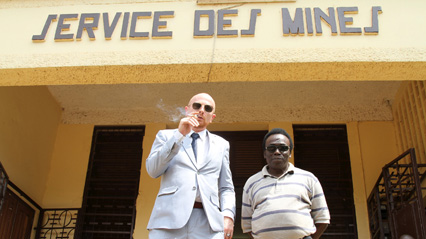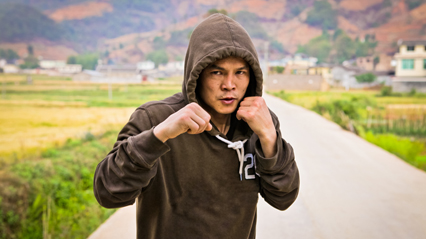

By Kim Voynar Voynar@moviecitynews.com
Sundance Preview: World Documentary Competition
As with the US Documentary competition, there looks to be a lot worth checking out in the World Documentary competition at Sundance this year. Here are the ones that I’m putting on my short-list. (Note: All film descriptions are from the Sundance film guide.)
5 Broken Cameras, Emad Burnat, Guy Davidi (Palestine/Israel/France)
What It’s About: Five broken cameras—and each one has a powerful tale to tell. Embedded in the bullet-ridden remains of digital technology is the story of Emad Burnat, a farmer from the Palestinian village of Bil’in, which famously chose nonviolent resistance when the Israeli army encroached upon its land to make room for Jewish colonists. Emad buys his first camera in 2005 to document the birth of his fourth son, Gibreel. Over the course of the film, he becomes the peaceful archivist of an escalating struggle as olive trees are bulldozed, lives are lost, and a wall is built to segregate burgeoning Israeli settlements.
Gibreel’s loss of innocence and the destruction of each camera are potent metaphors in a deeply personal documentary that vividly portrays a conflict many of us think we know. Emad Burnat, a Palestinian, joins forces with Guy Davidi, an Israeli, and—from the wreckage of five broken cameras—two filmmakers create one extraordinary work of art.
Pedigree: A unique collaboration between a freelance photographer and a documentary filmmaker.
The Ambassador, Mads Brügger (Denmark)
What It’s About: An enigmatic and decadent white diplomat arrives in central Africa sporting dark glasses, riding boots, and a cigarette holder. He has recently bought an ambassadorship and claims to be a do-good rich businessman spearheading a diplomatic mission. Officially, he is there to start a factory that will employ locals to produce matches. Unofficially, he has really come to gain access to the area’s vast reserves of diamonds. It soon becomes apparent that, in this postcolonial economy, nearly everyone is out to rip off everyone else, and the dangers become all too real.
Pedigree: Brügger’s 2010 film, The Red Chapel, won the world docs jury prize at Sundance in 2010.
China Heavyweight, Yung Chang (Canada/China)
What It’s About: In southwestern China, state athletic coaches scour the countryside to recruit poor, rural teenagers who demonstrate a natural ability to throw a good punch. Moved into boxing training centers, these boys and girls undergo a rigorous regimen that grooms them to be China’s next Olympic heroes but also prepares them for life outside the ring. As these young boxers develop, the allure of turning professional for personal gain and glory competes with the main philosophy behind their training—to represent their country. Interconnected with their story is that of their charismatic coach, Qi Moxiang, who—now in his late thirties and determined to win back lost honor—trains for a significant fight.
Pedigree: Yung Chang’s 2008 film Up the Yangtze, which played at Sundance, was one of my favorite docs of that year. Looking forward to this one.
The Imposter, Bart Laydon (U.K)
What It’s About: It’s 1994: a 13-year-old boy disappears from his home in San Antonio, Texas. Three and a half years later, he is found alive, thousands of miles away, in Spain. Disoriented and quivering with fear, he divulges his shocking story of kidnap and torture. His family is overjoyed to bring him home. But all is not what it seems. Sure, he has the same tattoos, but he looks decidedly different, and he now speaks with a strange accent. Why doesn’t the family seem to notice these glaring inconsistencies? It’s only when an investigator starts asking questions that this astounding true story takes an even stranger turn.
Like his canny subject, gifted filmmaker Bart Layton pulls off an astonishing coup. Buoyed by eye-catching dramatizations and an enthralling structure that crisscrosses time and place, The Imposter unfolds as a gripping thriller that leaves us dizzy, yet certain that truth is, indeed, stranger than fiction.
Pedigree: An acclaimed television documentarian exploring what sounds like an most intriguing story. Count me in.
Payback, Jennifer Baichwal (Canada)
What It’s About: Jennifer Baichwal’s brilliant documentaries exemplify the alignment of form with content as she imaginatively transposes other artists’ work into the film medium to explore and expand their narratives. In her latest such project, Baichwal undertakes the ambitious task of cinematizing Payback, Margaret Atwood’s visionary book of essays about systems of wealth, justice, and reparation.
Seemingly disparate forays into the worlds of migrant tomato pickers in Florida, feuding clans in Albania, victims of BP’s oil spill, and a repentant inmate all mix with insights from thinkers like theologian Karen Armstrong, ecologist William Rees, public critic Raj Patel, and Atwood herself. Integrating Atwood’s words with their outlooks, Baichwal’s luxurious pacing, arresting imagery, and astonishing juxtapositions stimulate provocative associations among ideas and realities.
Both visceral and revelatory, Payback plunges us deeply into reconsidering the roots of social inequity, what we value, and debt’s profound role as an organizing principle in our lives—one that shapes relationships, society, and the fate of the planet.
Pedigree: New film from the director of Manufactured Landscapes, which has one of the most amazing opening sequences ever. Do I need to say anything more? I didn’t think so.
Putin’s Kiss, Lise Birk Pedersen (Denmark)
What It’s About: Masha Drokova is a rising star in Russia’s popular nationalistic youth movement, Nashi. A smart, ambitious teenager who—literally—embraced Vladimir Putin and his promise of a greater Russia, her dedication as an organizer is rewarded with a university scholarship, an apartment, and a job as a spokesperson. But her bright political future falters when she befriends a group of liberal journalists who are critical of the government, including blogger Oleg Kashin, who calls Nashi a “group of hooligans,” and she’s forced to confront the group’s dirty—even violent—tactics.
In her first feature, Danish filmmaker Lise Birk Pedersen offers a chilling view of modern Russia, its fragile—perhaps illusory—democracy, and Nashi’s alarmingly fascist tendencies (mass rallies, book burnings, “patriotic education,” and vilification of opponents). But, distinguished by an artful, cinematic aesthetic and astonishing intimacy, the film’s emotional weight lies in the evolution of Masha’s political consciousness. Putin’s Kiss reminds us that all politics are deeply personal.
Pedigree: Feature documentary debut.




















